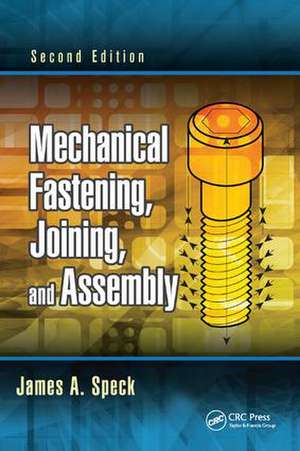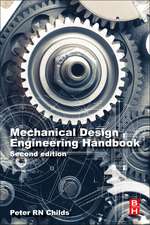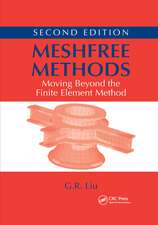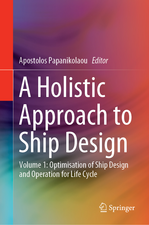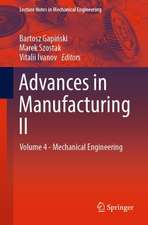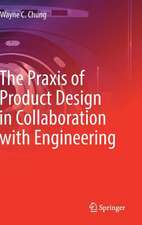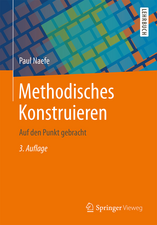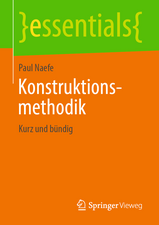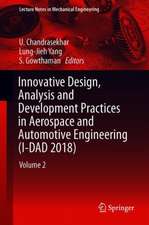Mechanical Fastening, Joining, and Assembly
Autor James A. Specken Limba Engleză Paperback – 26 iul 2017
A good design, quality parts, and properly executed assembly procedures and processes result in well-fastened assemblies. Utilizing a combined knowledge of mechanical assembly engineering and fastening technology, Mechanical Fastening, Joining, and Assembly, Second Edition provides readers with a solid understanding of mechanical fastening, joining, and assembly information. Based on the author’s experience in the field, this updated mechanical arts guide and reference chronicles the technical progress since the first edition was published more than a decade ago.
Provides Case Studies Showing Real-World Applications for Commonly Used Assemblies
The second edition addresses recent trends in the industry, and looks at new fastening technologies used in aerospace, automotive, and other key areas. It explains the fastening function in depth, and describes the types of fastening approaches that can be used effectively. The revised text expands on the presentation and review of fastened components, detailing the assembly, design, manufacturing, and installation of fastener products and procedures. It covers specific joining applications, including vibration, standard, and special materials; details environmental factors; and provides useful reference charts for future use.
What’s New in the Second Edition:
- Provides an up-to-date selection of technologies
- Contains practical approaches to modern fastener technology
- Reviews engineering fundamentals with a focus on their application in the fastener industry
- Includes a section on fastener statics
- Expands on fastener manufacturing processes, most specifically cold heading and roll threading
- Adds fastener dynamics to draw attention to forces in motion (wind turbine hub turning in strong winds) and fastener strength of materials
- Extends review of the economics of fastening and provides some tools for engineering economics
- Examines the difference in static and dynamic strengths
- Considers fastener materials in this new century, provides some observations about the fastener laboratory, and discusses electrical theory
- Addresses sustainability, application product management, thermodynamics, energy systems, and new thought maps for application analysis
- Takes a look at a favorite application, D&D 100, and more
Preț: 427.84 lei
Preț vechi: 552.57 lei
-23% Nou
Puncte Express: 642
Preț estimativ în valută:
81.88€ • 85.17$ • 67.59£
81.88€ • 85.17$ • 67.59£
Carte tipărită la comandă
Livrare economică 14-28 aprilie
Preluare comenzi: 021 569.72.76
Specificații
ISBN-13: 9781138748408
ISBN-10: 1138748404
Pagini: 384
Ilustrații: 201
Dimensiuni: 156 x 234 mm
Greutate: 0.45 kg
Ediția:2
Editura: CRC Press
Colecția CRC Press
ISBN-10: 1138748404
Pagini: 384
Ilustrații: 201
Dimensiuni: 156 x 234 mm
Greutate: 0.45 kg
Ediția:2
Editura: CRC Press
Colecția CRC Press
Public țintă
Professional Practice & DevelopmentCuprins
Fastener Functions and Assembly Testing. Fastener Types and Their Production. Fastening and Joining Mechanics. Economic Factors in Fastener/Assembly Decisions. Assemblies under Dynamic Loading. Assembly Sites and Systems. Fastener Materials. Environmental Factors and Corrosion. Assembly Analysis. References. Index.
Notă biografică
James A. Speck, PE, worked as a regional manager of The Johnson Gage Company, Bloomfield, Connecticut, following a career in the fastener industry. He has trained and served as a technical expert in the Department of Commerce’s National Voluntary Laboratory Accreditation program for fasteners and metals; presented numerous workshops and seminars on fastener fundamentals, fastener applications engineering, and screw thread technology; and authored numerous publications. He received his BS (1971) in business administration from Drexel University, Philadelphia, Pennsylvania, and an MS (1974) in management from the Hartford Graduate Center, Hartford, Connecticut, and he is a licensed professional engineer in Connecticut.
Descriere
This edition offers practical information for understanding how fasteners and fastening systems work as well as how these products and systems are manufactured. It provides the knowledge and tools necessary to increase fastening system performance and reliability.
